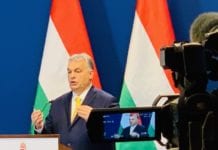Listen to this BosNewsLife report via the Voice of America. Click US Election React East Europe
By Stefan J. Bos, Chief International Correspondent BosNewsLife reporting from Budapest, Hungary

BUDAPEST, HUNGARY (BosNewsLife)– Ex-communist countries of Central and Eastern Europe are closely watching how the re-election of U.S. President Barack Obama will impact them amid concern that American foreign policy has shifted away from the region.
The Hungarian Airforce Band played American classics as Hungarians, U.S. citizens and others gathered in Budapest for what was dubbed Europe’s largest election-night event.
Roughly 1,500 invited people crowded a ballroom and adjacent areas decorated with balloons, life-size pictures of the presidential candidates and a replica of the White House Oval Office in one of the Hungarian capital’s most luxurious hotels.
Residents from Hungary, a still young democracy, watched with amazement as large television screens displayed the election results, which eventually showed a clear victory for President Barack Obama.
Though leaders of Hungary and other Central and Eastern European countries later congratulated Mr. Obama on his re-election, celebrations were overshadowed by concerns.
RUSSIA’S GROWING INFLUENCE
Hungarian Deputy Prime Minister Tibor Navracsics told BosNewsLife he hopes the president will focus more on Hungary and other countries that were occupied for decades by Soviet Union forces, amid worries about the growing influence of Russia.
“I think the Central European nations now somehow vanished in the eyes of the American foreign policy,” said Navracsics. “The American foreign policy think tanks and analysts think that Central Europe is in a safe and dry place and it is not in danger of a possible Russian influence. We sometimes think differently.”
High on his wish list are Washington-backed American investments as crisis-hit Hungary is forced to

negotiate more than $19 billion in financial assistance from the International Monetary Fund and the European Union.
Navracsics said he believes a deal will be signed this year or early 2013, despite tensions between Hungary and the organizations that reportedly demand austerity measures and the end of controversial taxes on banks and mainly foreign companies.
Hungary is among several ex-communist European Union member states demanding closer ties with the United States.
US-EU FATIGUE
These sentiments are shared by European Parliament President Martin Schulz, who on Wednesday met the wives of political prisoners from autocratically ruled Belarus.
“In the last two-to-three years, from time to time, we felt a certain kind of ‘fatigue’ in the relationship between the EU and the United States of America,” he said.

“The re-election of Barack Obama on the basis of his program is an encouragement for all of us, for more cooperation on the basis [of] our common interests in the fight against worldwide speculation, [the] fight against the problems of climate change and in cooperation for peace, justice and development worldwide,” Schulz said.
But Poland’s foreign minister is not optimistic that will happen immediately. He told a Polish radio station that President Obama is expected to focus on the Middle East, following his election victory on Tuesday.
Minister Radek Sikorski said in a statement that “traditionally, second term presidents, especially from the Democratic Party, try to do more to resolve the Israeli-Palestinian conflict.” He was quoted as saying Mr. Obama “has already promised to help establish a Palestinian state.”
But the leaders of former Eastern-bloc nations hope President Obama will include their turbulent region, with its newfound freedom, in his busy four-year schedule. (This BosNewsLife NEWS WATCH first aired via Voice of America (VOA). NEWS WATCH is a regular look at key news developments especially in, but not limited to, (former) Communist nations and other autocratic states impacting the Church and/or compassionate professionals).








